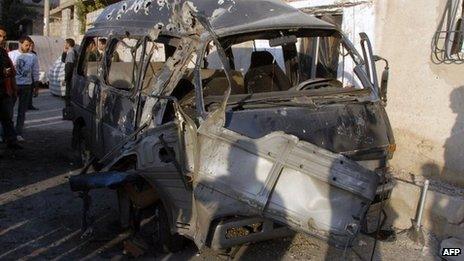Syria rebels attack Assad strongholds in Damascus
- Published

Syrian rebels have carried out fresh attacks on government facilities and strongholds in the capital, Damascus.
Mortar shells landed in Mezzeh 86, an Alawite district near the presidential palace, and hit the prime minister's offices and Mezzeh military airfield.
Activists said the escalation might herald a concerted rebel campaign.
Meanwhile, Syria's main opposition bloc has elected a new leadership team at a general assembly in Qatar.
However, women delegates staged an angry protest when the Syrian National Council's (SNC) all-male team was announced in Doha, the Associated Press news agency reported.
Earlier, UK Prime Minister David Cameron urged newly re-elected US President Barack Obama to work with him to "do more" to end the conflict.
He said the US and its allies should do more to "shape the opposition, outside Syria and inside Syria, and try to help them achieve their goal - which is our goal - of a Syria without [President Bashar al-] Assad".
Mr Cameron made the plea after hearing "truly horrendous" stories of suffering from refugees at the Zaatari camp in northern Jordan.
In another development on Wednesday, a senior Turkish foreign ministry official told Reuters news agency that Ankara would make an official request to Nato to deploy a Patriot surface-to-air defence missile system along the border with Syria.
'Response to massacres'
In Syria, state media broadcast pictures of the aftermath of the mortar explosions in Mezzeh 86, a western district of Damascus mostly populated by members of the president's Alawite minority sect.
The Syrian Observatory for Human Rights (SOHR), a UK-based activist group, reported that three civilians had been killed and 12 injured.
Opposition activists said Mezzeh 86 had not been the target of the mortar fire. Rather, the rebels had targeted the nearby hilltop palace housing President Assad's offices, but made mistakes in calculating the trajectory of the projectiles, the activists added.
"This operation came in response to the massacres committed in our beloved city," the Lions of Islam rebel group said in a statement.
Mortars also fell on Hajar al-Aswad, killing three civilians, and there was fighting between government forces, rebels and Palestinian fighters supporting either side in the Yarmouk refugee camp, the SOHR said. Later, troops bombarded the town of Beit Sahm, it added.
The official Sana news agency reported that a judge had been killed in the capital's north-eastern Barzeh district. A bomb planted underneath Abad Nadhwah's car was detonated remotely, it added.
Fierce shelling and air strikes by government forces were also reported in several areas, a day after rebel groups carried out a series of bomb attacks.
On Tuesday, at least 10 people were killed in a series of explosions in Damascus, including one targeting the north-western, predominantly Alawite area of Waroud.
A spokeswoman for the Revolutionary Council in Damascus said she believed "the countdown has started".
"It seems something serious is going on there now and things are going out of control. The regime cannot control Damascus anymore," Susan Ahmed told the Guardian.
'Marginalised'
The SNC assembly in Doha is due to select an 11-member executive body and a new president.
Its election of the all-male 40-strong leadership body on Wednesday surprised many of those present, AP reported.
Rima Fleihan, a Syrian writer and activist, said women inside Syria were playing a key role in anti-regime protests and should not be marginalised by the opposition in exile.
The SNC's failure to present a united front against President Assad has brought widespread criticism.
The US has said it wants to set up a broader opposition leadership council in which the SNC's influence is diluted.
The Syrian National Initiative, proposed by prominent dissident Riad Seif, would supplant the SNC and bring together Syria's exiled and internal opposition, allowing it become the conduit for foreign assistance.